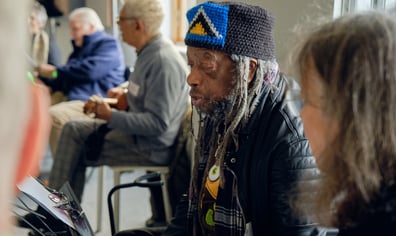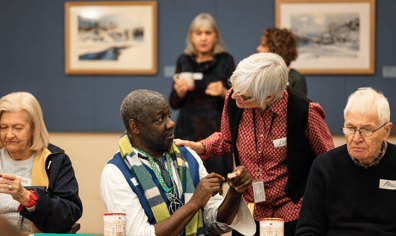About us
Who we are
Our vision is for there to be nationwide access to appropriate artistic stimulation that enables all people affected by dementia to live more fulfilled, active lives at home and in the community. In collaboration with artists and cultural organisations we support, promote and deliver inspiring arts activities for people living with the early stages of dementia.
We are a small charity but a leader in our field. We deliver inspiring arts workshops across art forms, partnering with artists, galleries, museums and community organisations. We train facilitators from around the country in early stage dementia awareness and how to deliver effective arts-based activities for people living with dementia. We raise awareness of the value of the arts for people affected by dementia through our advocacy work, and help people find great creative activities through our website’s unique national mapped listing of arts workshops for people living with dementia.
Our culture and values
Our values are: Creative; Inclusive; Collaborative; Empowering; Inspiring
Equality, diversity and inclusion policy
Arts for Dementia wishes to respect and value all people we come into contact with, irrespective of their differences. We wish to secure genuine equality of opportunity in all aspects of our work.
The charity aims to offer equal opportunities to the people it serves, in service delivery, volunteering and employment. By valuing the diversity that different people bring to our organisation we can create an environment where everyone feels valued and where everybody’s contributions, skills and competencies are fully utilised.
Arts for Dementia is committed to ensuring that it promotes equality, diversity and accessibility through its decision-making and service provision. We will always actively oppose any form of discrimination, whether against persons defined in legislation as having protected characteristics or otherwise, and promote equality and diversity.
Arts for Dementia recognises its obligations under The Equality Act 2010 and other relevant legislation. The Act specifically covers nine protected characteristics, meaning that it provides protection from discrimination in the following areas: sex, sexual orientation, marriage or civil partnership, gender reassignment, race, religion or belief, age, disability, pregnancy and maternity. However, Arts for Dementia wishes to ensure that it not only complies with the law but also addresses principles of equality and diversity as a matter of course, whether people affected fall within the scope of legislation or not.
Arts for Dementia is working to ensure that no participants, volunteers, staff or Trustees experience discrimination. It is helping staff to identify potential risks and eliminate discrimination across the organisation. It has a framework for taking positive action to encourage diversity and equality and to include equal opportunities in all aspects of what the organisation does, from the strategy and workplan to delivering training and workshops.





